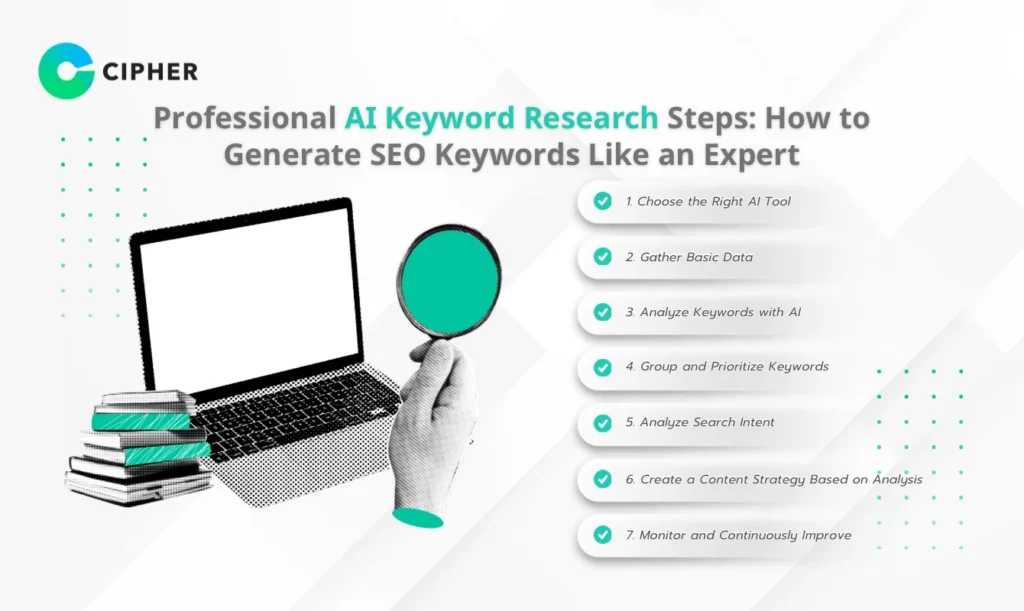Have you ever faced the problem of randomly guessing keywords, wasting time on ineffective SEO? Or perhaps you’ve heard your boss say, “I think customers are searching with this term, just do SEO as I told you,” only to discover that despite ranking well, website traffic remains disappointingly low?
Today, AI keyword analysis is playing a crucial role in revolutionizing the SEO industry, especially in helping you generate SEO keywords that actually drive traffic. This technology is helping marketers make more accurate decisions and save valuable time by providing intelligent keyword suggestions based on real search data.
In this article, we’ll explore how AI keyword analysis can help you generate keywords that convert and reveal new AI SEO strategies that combine human expertise with artificial intelligence capabilities. We’ll also introduce you to several keyword ideas generators that can transform your SEO approach.
Table of Contents
Why Keyword Research is the Heart of SEO

Keyword research is the process of finding words or phrases that people use to search for information on search engines. It’s considered the most important foundation of SEO fundamentals, and using a reliable keyword ideas generator is essential for this process.
Think of keyword research as market research before launching a business. If you choose the wrong keywords, no matter how good your content is, it might not be seen or may not meet your target audience’s needs. An effective AI keyword analysis tool can help you avoid this pitfall by providing quality keywords suggestions based on actual search behavior.
There was a case where a team leader instructed the team to optimize for “keyword translation” (with only 590 monthly searches) instead of “what is keyword” (with 1,600 monthly searches). The result? Even though they ranked #1, they received less than 200 website visitors per month, representing a loss in both time and resources. With proper keywords for AI content optimization, this mistake could have been avoided.
Keyword research helps you:
- Know which keywords to prioritize
- Develop strategies to generate SEO keywords that drive quality traffic
- Understand search intent
- Evaluate keyword competition levels
- Choose generator keywords with high conversion potential
Understanding Search Personas: Who's Searching for Your Keywords?
Understanding who’s searching for your keywords is crucial. AI keyword analysis helps us identify personas or user groups that are likely to search for those keywords with greater accuracy. This understanding allows you to generate keywords that specifically target these different audience segments.
Let’s look at the main personas to consider in SEO and how keywords suggestions might differ for each:
1. The Researcher
- Behavior: Often uses questions like “how,” “why,” and “what is” in searches
- Goal: Seeks in-depth information and details for education
- Keywords typically used: “What is SEO,” “How to do effective SEO,” “SEO techniques 2025”
- Strategy: Create How-to content, guides, in-depth articles
2. The Buyer
- Behavior: Often searches to compare products or services before making a purchase decision
- Goal: Find information for purchase decisions
- Keywords typically used: “SEO service pricing,” “recommended SEO companies,” “Ahrefs vs SEMrush comparison”
- Strategy: Focus on comparative content, reviews, case studies, pricing and promotions
3. The Problem Solver
- Behavior: Has an immediate problem that needs urgent resolution
- Goal: Wants to solve a current problem
- Keywords typically used: “Fix website not ranking,” “How to fix Google Penalty,” “Why is my website traffic decreasing”
- Strategy: Create content offering specific solutions, FAQs, detailed troubleshooting steps
4. The Local Seeker
- Behavior: Searches for services or products in nearby areas
- Goal: Wants services in their local area
- Keywords typically used: “SEO companies in London,” “SEO services in Manchester,” “SEO experts near me”
- Strategy: Implement Local SEO, create area-specific content, use Google My Business
5. The Executive
- Behavior: Needs strategic information and overviews
- Goal: Make business decisions
- Keywords typically used: “ROI of SEO,” “SEO strategy for business,” “SEO trends 2025”
- Strategy: Create strategic content, research reports, analysis, whitepapers
Understanding personas helps you tailor content to meet the needs of each group accurately. AI keyword analysis can help identify which keywords for AI content creation are typically searched by which personas and how to create content that addresses their needs. Effective keyword ideas generators will provide different suggestions based on these persona types.
How AI SEO is Changing Online Marketing in 2025
2025 is a year where AI SEO is playing a significant role in information search. Internet users no longer search for information in the traditional way but are beginning to use more natural questions and expect relevant answers, which affects how keywords for AI optimization need to be selected. The ability to effectively generate SEO keywords that match these natural language queries has become essential.
Recent reports show:
- 54% of SEO experts use AI keyword analysis in their work
- Google creates AI-generated answers for 8.71% of all keywords
- Searches using phrases longer than 10 words have a 19.10% chance of triggering AI Overviews
- Websites referenced in Google AI Overviews are mostly (84.72%) websites ranking 1-10 in organic search results
This shows that if you want your website to be referenced in AI Overviews, you still need to rank high in normal search results. This means basic SEO principles remain important, but you need to add AI SEO strategies suitable for the AI era.
Keywords That Trigger AI Results in 2025: Optimizing Your Keyword Generator Strategy
Keywords that typically trigger AI Overviews are changing rapidly, but there are interesting patterns you can use in your AI SEO strategy. A good keyword ideas generator will help you identify these patterns and generate keywords that have a high likelihood of triggering AI displays.
Questions that often trigger AI results:
- “What is” type questions increased by 20%
- “How to” type questions increased by 15%
- Phrases containing “symptoms of” increased by approximately 12%
- Questions with the word “treatment” increased by 10%
Interestingly, specific longtail target keywords often trigger AI Overviews more than broad terms, even though they have lower search volumes. This is where AI keyword analysis tools excel by finding these valuable niche opportunities.
Therefore, in addition to ranking high with SEO, you should also adapt your content to answer specific questions to increase the chances of being referenced by AI.
How AI Analyzes Keywords: The Science Behind Keyword Ideas Generators
1. Analyzes Big Data Quickly
AI keyword analysis can process large amounts of data in a short time, allowing you to analyze many keywords simultaneously, which would take much longer to do manually. Modern keyword ideas generators leverage this capability to provide extensive keyword suggestions in seconds.
For example, AI keyword analysis can pull data from Google Analytics, Search Console, and other SEO analysis tools, then process them together to identify high-potential keywords and generate SEO keywords that align with your audience’s needs.
2. Discovers Latest Trending Keywords
AI keyword analysis can detect recent patterns and trends, ensuring you don’t miss hot keywords, even ones you might not have thought of before. Advanced generator keywords tools constantly monitor search trends to provide up-to-date suggestions.
For instance, AI keyword analysis might discover that in the past two months, people have started searching for “AI SEO analysis” 300% more, which is a good opportunity to create content before competitors. These trending keywords suggestions are invaluable for staying ahead of the market.
3. Analyzes Competitors' Keywords
AI keyword analysis can scan competitor websites and identify the keywords they use in detail, including analyzing which keywords generate the most traffic for them. This competitive intelligence helps you generate keywords that can either compete directly or target untapped opportunities.
Knowing what strategies competitors are using helps you decide whether to compete or avoid those keywords and focus on gaps in the market. The best keyword ideas generators will automatically highlight these competitive insights.
4. Keyword Clustering
AI keyword analysis can intelligently group related keywords, helping you create comprehensive content that better addresses user needs. These clusters of keywords suggestions allow for more strategic content planning that targets multiple related search terms simultaneously.
For example, instead of creating separate articles for “how to find keywords,” “keyword research tools,” and “keyword selection techniques,” AI might suggest combining them into one comprehensive article to increase the chance of ranking higher. This approach to generate SEO keywords clusters is particularly effective for comprehensive content strategies.
5. Evaluates Keyword Difficulty
AI keyword analysis can analyze the difficulty of ranking for specific keywords by considering various factors such as the Domain Authority of ranking websites, content quality, and the number of backlinks. The best keyword ideas generators provide difficulty scores to help you prioritize your efforts.
For example, the keyword “car insurance” might have very high competition because large insurance companies dominate the rankings, but “classic car insurance” might have much lower competition. Finding these valuable longtail target keywords is where AI truly excels compared to manual research.
Adapting Keyword Research for Different Personas: Personalized Keyword Suggestions
For The Researcher
- Search technique: Use the “related:” command in Google to find related keywords
- AI Strategy: Have AI analyze questions on websites like Quora and Reddit to understand what researchers are asking about your topic
- Keywords to focus on: Keywords with questions “how,” “why,” “what is”
For The Buyer
- Search technique: Use Google Auto-complete to see what people are searching for about your product
- AI Strategy: Have AI analyze product reviews to find words customers often use when talking about your type of product
- Keywords to focus on: Keywords with words like “compare,” “price,” “review,” “best”
For The Problem Solver
- Search technique: Search for terms like “problem,” “fix,” “solution” along with your main keywords
- AI Strategy: Have AI analyze forums and discussion groups to find problems people are facing
- Keywords to focus on: Keywords with words like “fix,” “problem,” “not working,” “how to solve”
For The Local Seeker
- Search technique: Combine area names with your main keywords
- AI Strategy: Have AI analyze local searches in each area to understand specific local needs
- Keywords to focus on: Keywords that include state, city, district, or neighborhood names
For The Executive
- Search technique: Search for terms like “strategy,” “ROI,” “trends” along with your main keywords
- AI Strategy: Have AI analyze articles in business media to understand what executives are interested in
- Keywords to focus on: Keywords with words like “strategy,” “trends,” “returns,” “investment”
Using AI keyword analysis to customize strategies according to personas will help you create content that resonates more with your target audience and increases conversion opportunities. The keyword suggestions provided will vary significantly between these different persona types, allowing for highly targeted content creation.
Types of Keywords to Know in the AI SEO Era: From Head Terms to Generator Keywords
Head Terms
Body Keywords
Long Tail Keywords
These are phrases with 4 or more words, like “how to do SEO to rank on Google’s first page,” “cheap single-story wooden prefab house designs.” They have the lowest search volume but most clearly indicate searcher intent and typically generate the best conversion rates. Advanced generator keywords tools specialize in finding these valuable longtail target keywords that competitors often miss.
In this AI SEO era, Long Tail Keywords are becoming more interesting because they often match the question format that users ask AI and have a high chance of appearing in AI Overviews. The ability to generate SEO keywords in this long-tail format is becoming increasingly valuable for SEO success.
AI Tools That Help with Keyword Analysis: Top Keyword Ideas Generators
1. Gemini
2. Ahrefs
Ahrefs is a leading SEO tool that uses AI keyword analysis to analyze keywords, content, link building, and ranking tracking. Ahrefs can show search volume, competition level, and accurately recommend related keywords. Its keyword suggestions feature is particularly powerful for finding longtail target keywords with high conversion potential.
3. Frase
4. Surfer SEO
How to Choose Quality Keywords with AI: Beyond Basic Keyword Suggestions
Even with AI keyword analysis helping, you still need to know the basic principles for choosing quality keywords that convert. Here are strategies to evaluate the keywords suggestions provided by keyword ideas generators:
- Choose keywords that match your products or services – For example, if you build websites, start with the keyword “website development services” and use AI keyword analysis to expand from there
- Check search volume – Choose keywords with reasonable search volume, at least 1,000+ searches monthly for primary terms
- Choose keywords that clearly indicate intent – For example, “office desk” is better than “desk” because we understand the searcher’s need more clearly
- Check Search Intent – See what kind of search results your chosen keywords generate; if the first page is all videos, creating an article might not be the best strategy
- Focus on generator keywords with conversion potential – For example, keywords with terms like “price,” “review,” “where best,” “services” often indicate high purchase intent
- Assess competition level – Use AI keyword analysis to help analyze how competitive a keyword is by looking at competitors on Google’s first page
Prioritize valuable longtail target keywords – These often have lower competition while still driving qualified traffic
A simple technique to assess competition is to use the command allintitle:keyword in Google, such as allintitle:prefab house, and check the number of results. More results indicate higher competition.
Professional AI Keyword Research Steps: How to Generate SEO Keywords Like an Expert

Here are the steps CIPHER recommends for keyword research using AI keyword analysis. This process will help you generate keywords that drive real business results:
1. Choose the Right AI Tool
2. Gather Basic Data
3. Analyze Keywords with AI
4. Group and Prioritize Keywords
5. Analyze Search Intent
6. Create a Content Strategy Based on Analysis
Companies that implement comprehensive AI-powered SEO strategies have seen up to 65% increase in organic traffic and significantly improved conversion rates compared to traditional approaches.
7. Monitor and Continuously Improve
Creating SEO Content with AI That Remains Natural: From Keywords to Content
Using AI SEO to create content is another important trend, but it must be done wisely to ensure content remains natural and valuable to readers. The keywords for AI content creation need to be incorporated naturally to avoid keyword stuffing.
AI keyword analysis can help in several ways:
- Recommend article structures that cover key points based on top-performing content
- Create draft content using generator keywords that match user intent
- Suggest appropriate use of heading tags (H1, H2, H3) for optimal keyword placement
- Propose optimal placement of primary and longtail target keywords in important positions
However, you should always check and refine content created by AI SEO to ensure accuracy, relevance, and human quality, as Google still prioritizes content that provides value to readers.
CIPHER's AI SEO Services: Expert Keyword Ideas Generator Solutions
1. AI Keyword Research to Find Powerful Keywords
2. AI-Driven Content Strategy
3. SEO Performance Analytics with AI
4. AI SEO Optimization
5. Local SEO with AI
Summary: The Future of NLP with Digital Business
In 2025, AI keyword analysis has become an essential tool that saves time and increases SEO efficiency. The ability to generate SEO keywords that truly match user intent is now a critical competitive advantage. However, true success still comes from combining AI capabilities with human creativity.
Those who understand both basic SEO principles and know how to leverage keyword ideas generators as supplementary tools will have a competitive advantage in the digital marketplace. The future belongs to marketers who can effectively utilize keywords for AI content optimization while maintaining a human touch in their content creation process.
If you need assistance implementing these advanced strategies, CIPHER is ready to be your partner in helping your business increase sales through AI SEO and our proprietary keyword suggestions technology.





